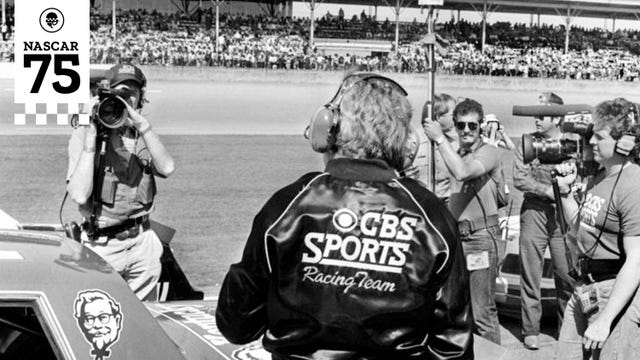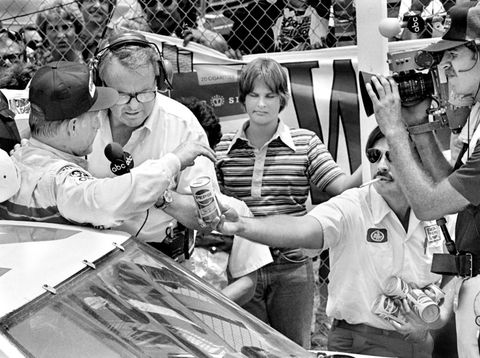NASCAR TV Deals Brings Mega Bucks, More Eyeballs to the Sport

Robert AlexanderGetty Images
- The first mega-TV deal came in 1999, when NASCAR turned the sport’s popularity boom of the 1990s into a six-year TV rights deal with FOX, NBC and TBS valued at $2.4 billion.
- The deal began in 2001 and brought 70% of the races to network television, and NASCAR has never looked back.
- All eyes are now on the negotiations for 2025.
The first NASCAR race to be televised wirelessly on network television was the 1979 Daytona 500. Hosted by CBS, it is considered one of, if not the most important race in stock car history.
It was a race that got everyone talking and put NASCAR on the map nationally. Richard Petty won the race and two other prolific figures in the sport, Cale Yarborough and Donnie Allison, had a street fight on the backstretch in front of the whole country.
That show also introduced the in-car camera, the speed shot, and loads of product placement—all of which can still be seen on TV shows today.
Now NASCAR appears to be on the verge of a TV deal that could bring the sport as much as $1 billion a year.
Yes, TV is a big thing for NASCAR.
The first mega-TV deal came in 1999, when NASCAR turned the sport’s popularity boom of the 1990s into a six-year, $2.4 billion TV rights deal with FOX, NBC and TBS. The deal began in 2001 and brought 70% to network television, and NASCAR has never looked back.
Prior to 2001, NASCAR had separate contracts for its races with ABC, CBS, NBC, ESPN, TNN, and TBS.
“All of this development has debunked that old redneck stereotype,” said then-NASCAR boss Mike Helton when announcing the deal. “I think we can stand pretty tall and feel really good about the age range, the economic level and the balance between men and women that we have now. It all comes from the exposure.”
The next TV deal, starting in 2007, was another whopper — eight years, $4.8 billion with FOX/Speed Channel, ABC/ESPN and TNT all getting in on the action.
NBC returned to the group in 2015 and has since shared the NASCAR stage with FOX. The current deals run through 2024 and will earn NASCAR $8.2 billion for that 10-year run.
All eyes are now on the negotiations for 2025. ESPN could be a player this time. The placeholder is streaming services. After all, if Amazon Prime can pull NFL football games on Thursday nights, it’s not out of the question, and a streaming service might want a piece of the NASCAR pie.
Don’t think the drivers aren’t careful.
Earlier this year, NASCAR Cup driver Chase Briscoe signed a contract extension with Stewart-Haas Racing. Some in the paddock said Briscoe should have waited to see what the TV deal entailed.
That’s where Briscoe and his camp had things covered. His deal with SHR includes a clause that requires both parties to return to the table for possible renegotiations – depending on the upcoming TV deal and how much money goes to the teams.
“We’ve had to make a lot of arrangements (contract) if it (TV funds) gets restructured,” Briscoe said of the deal. “It’s not fair to the team and of course it’s not fair to me if the whole structure of the money that goes into the sport changes. We’ve just got to have a lot of wording about where, if it’s changed, and of course if it’s found out we’re going to come back and sit down and try to figure out what’s fair to both of us.
If past TV deals are any indication, it will be more than fair.

